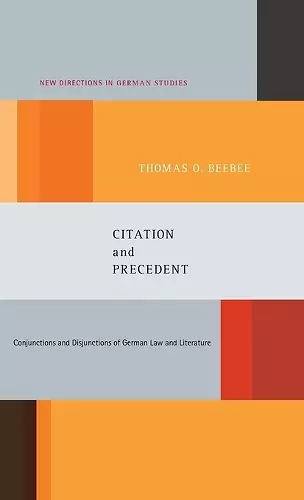Citation and Precedent
Conjunctions and Disjunctions of German Law and Literature
Professor Thomas Oliver Beebee author
Format:Hardback
Publisher:Continuum Publishing Corporation
Published:26th Jan '12
Currently unavailable, and unfortunately no date known when it will be back

This book traces a history of the sometimes fraught relationship between German law and literature in the modern period, from Grimm to Schmitt. Among Western literatures, only the German-speaking countries can boast a list of world-class writers such as Goethe, Hoffmann, Kleist, Kafka, Schmitt, and Schlink who were trained as legal scholars. Yet this list only scratches the surface of the complex interactions between German law and literature. It can be supplemented, for example, with the unique interventions of the legal system into literature, ranging from early 20th century attempts to save literature from the tidal wave of Schund (pulp fiction) to audiences suing theaters over the improper production of classics in the 21st. The long list of instances where German literature cites law, or where German law serves literature as a precedent, signal the dream of German culture for a unity of interests and objectives between spheres of activity. Yet the very vitality of this dream stems from real historical and social processes that increasingly autonomize and separate these domains from each other. Beebee examines the history of this dialectical tension through close readings of numerous cases in the modern era, ranging from Grimm to Schmitt. This series offers a forum for the publication of new works in all areas of German Studies (German, Austrian, and Swiss literature, culture, and cinema from any period). New Directions in German Studies welcomes proposals that offer a fresh perspective on any vibrant aspect of the field. A long and venerable tradition of "Germanistik" has been opened up in exciting ways in the past few decades. The series taps into that tradition and its growth into "German Studies," reframing aspects of the discipline in light of concerns germane to these fields: German, Austrian, or Swiss national identity and aesthetics; historical approaches to German-language literature and cinema; the legacy of the Holocaust and its influence on aesthetics; politics and aesthetics; issues of canonization and periodization; the place of gender, queer, and postcolonial studies within German Studies; the aesthetics of exile; myth and national identity; cross-cultural dialogues and aesthetics; material culture; German-language aesthetics and globalization. We welcome interdisciplinary approaches to the analysis of the rich intellectual and cultural histories of the German-speaking countries and areas. We are interested in projects focusing on hitherto under represented authors and filmmakers as well as those that seek to reframe canonical works in light of new perspectives and methodologies.
"Kafka, Benjamin, Schmitt—that German-speaking writers and thinkers of the early 20th century are obsessed with 'the law' is well-known. Citation and Precedent widens our historical and conceptual perspective. Beebee reconstructs not only a dense intertextual network of law, literature, and philosophy that pervades German culture from Kant to Peter Weiss; he also shows that these crossings and borrowings are driven by the dream, or the nightmare, of a 'culture' capable of uniting law and life, codified norm and everyday reality. This is an excellent book." -- Andreas Gailus, Associate Professor of German, University of Michigan, USA
"Is systems theory (Luhmann) an effective tool for investigating the relationship of law and literature? In a series of subtle and imaginative readings of German-language texts and cultural history, Beebee shows how the autonomy and differentiation of systems allows for registering levels of law's and literature's mutual observation that more common theories of representation fail to capture. Especially fascinating are his analyses of Carl Schmitt's self-identification with Melville's Benito Cereno and Peter Weiss's play on the 1960s' Auschwitz trials." -- William Rasch, Professor, Department of Germanic Studies, Indiana University, USA
…adds an important facet to the discussion in the field and encourages a more comparative view on this topic. -- Ralph Grunewald, University of Wisconsin-Madison * Monatshefte *
ISBN: 9781441117908
Dimensions: unknown
Weight: unknown
296 pages